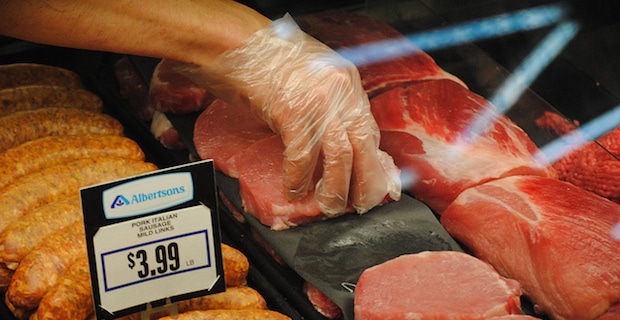
Last month, the U.S. House of Representatives passed a bill to repeal country of origin labeling laws (COOL) that inform consumers where the animals in beef, poultry, and pork products were born, raised and slaughtered. The bill (H.R. 2393) goes to the Senate.
Read more about COOL
COOL, passed by Congress in 2002 and 2008, has met with opposition from both the meat packing industry and Canada and Mexico. The U.S. Department of Agriculture (USDA) oversees COOL which includes muscle cut and ground meats (beef, veal, pork, lamb, goat, and chicken). It also includes non-meat products: wild and farm-raised fish and shellfish; fresh and frozen fruits and vegetables; peanuts, pecans, and macadamia nuts; and ginseng. Before September 30, 2008, meat processed in the U.S. was considered to be a U.S. product, requiring no labeling with details of its geographic history.
Canada and Mexico challenged revised COOL standards at a World Trade Center dispute panel, successfully arguing that it is a barrier to trade. Although the U.S. appealed the dispute ruling, in May 2015 the WTO Appellate Body ruled in favor of Canada and Mexico. Back in 2009, Canada described COOL as a “mandatory U.S. labeling measure that imposes unfair and unnecessary costs on integrated North American supply chains, reducing competitiveness in both Canada and the U.S. and creating confusion and uncertainty for livestock industries on both sides of the border.”
Despite the strong protests from Canada, there are three reasons why COOL is a badly needed regulation:
1. It is what consumers want.
A 2013 survey by Consumer Federation of America found that 90 percent of Americans polled favored, either strongly or somewhat, requiring food sellers to include COOL labeling on the fresh meat they sell. A total of 87 percent of those polled also favored requiring food sellers to include the country or countries where animals were born, raised and slaughtered on package labels.
“These results demonstrate that U.S. consumers continue to strongly support country of origin labeling and want even more detailed information about where their meat comes from,” said Chris Waldrop, Director of the Food Policy Institute at Consumer Federation of America.
2. Consumers have a right to know where their food originated.
COOL is a “consumer rights law,” as an article by PolitiFact stated. It gives consumers more information about the food they buy. Repealing COOl deprives consumers of information, or as a letter by the Consumers Union states, H.R. 2393 deprives “consumers of vital information that helps them make informed choices about the food they buy and serve to their families.”
3. It protects consumers.
Back in early December, the news broke in Canada about a recall of 31,000 pounds of ground beef after a sample was found to be contaminated with E. coli. The CBC reported that recalls “was not widely publicized until the morning of Dec. 2 – three or four days after the "use by" dates of the packaged meat had passed.” The timeline, according to the CBC, “suggests the entire food safety system managed by Canadian Food Inspection Agency (CFIA) failed to either detect E. coli-tainted meat in a federally regulated processing facility or recall the problem batch until after any of the fresh meat had likely been consumed or thrown out.”
In other words, the CFIA failed to detect that the ground beef was tainted with E. coli or recall it until after consumers had either eaten or tossed the meat. That is just the sort of incident that proves American consumers need to know about the origins of the meat they buy.
Read more about imported food
Tell the Senate to vote no on repealing COOL
There is something you can do to let the Senate know where you stand on repealing COOL. Sign the petition by Consumers Union urging senators to vote no on repealing the meat labeling standards.
Image via Anthony Albright




